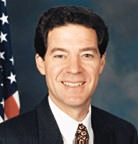|

Summer 1998 (6.2)
Page 57

  Azerbaijan Opts for Turkey Azerbaijan Opts for Turkey
"The decision of the Azerbaijani government and of the Azerbaijani
president is known. There are many ways to transport the main
oil to the international market. But for Azerbaijan - the only,
only one - the most beneficial and the most reliable is via Baku-Georgia-Turkey
to Jeyhan [a Mediterranean port of Turkey]."
Heydar Aliyev, President
of Azerbaijan, on the occasion of his 75th birthday [May 10,
1998] when 19 state delegations including Eduard Shevardnadze
of Georgia and Suleyman Demirel of Turkey came to Baku for a
private commemoration. Alternative routes for main oil under
consideration by AIOC [Azerbaijan International Operating Company]
include north through Russia and south through Iran.
  U.S. Must Act U.S. Must Act
"The U.S. must immediately assume a more consistent and
pro-active policy [in the Caspian Basin]. If we don't act soon,
we may be too late. . . The countries of the South Caucasus and
Central Asia-Armenia, Azerbaijan, Georgia, Kazakhstan, Kyrgyzstan,
Tajikistan, Turkmenistan and Uzbekistan are at a crossroads in
their history. They are newly independent. They are at the juncture
of many of today's major world forces. They are rich in natural
resources. And they are looking to the United States for support.
The stakes there for the United States are enormous."
Sam Brownback, U.S Senator (Kansas), addressing the U.S. Senate
Foreign Relations Subcommittee on International Economic Policy,
Export and Trade Promotion on October 23, 1997. Brownback has
introduced The Silk Road Strategy Act of 1997, [Senate Bill 1344],
which would boost U.S. ties with the Caspian Sea region and not
restrict aid to Azerbaijan.
  New Geopolitical Struggles New Geopolitical Struggles
"Much of history concerns the discovery and development
of new worlds, followed by struggles and wars among competing
empires seeking to dominate those new worlds. There are new regions
and new republics emerging from imperial domination which seek
political and economical alignment with the international community.
It is in the Caucasus and Central Asia that the next great geopolitical
struggles will occur. Hopefully, they will take place in a non-violent
manner. Without a doubt, Azerbaijan will be central to those
developments."
Galib Mammad, Director of
U.S.-Azerbaijan Chamber of Commerce, speaking at Harvard University
seminar about the Eurasian Transport Corridor on April 23, 1998.
  U.S.- Shooting Itself in the Foot U.S.- Shooting Itself in the Foot
"To be blunt, Section 907
[of the Freedom Support Act] has done nothing to bring
us closer to a lasting peace in the Nagorno-Karabakh conflict.
Politically, Section 907 and related provisions are an impediment
to our making progress on the Nagorno-Karabakh conflict, to our
ability to work effectively with Azerbaijan on the East-West
Eurasian transport corridor and to the ability of U.S. firms
to do business in Azerbaijan. The Azerbaijani government is strongly
pro-U.S. It is being helpful to us on Caspian energy questions,
on [nuclear] non-proliferation, on Iranian terrorism-and on Nagorno-Karabakh.
Section 907 has limited, and will continue to limit, the expansion
of U.S.- Azerbaijani relations-and all, to no useful purpose."
Ambassador Stephen Sestanovich, Ambassador-at-Large and Special
Advisor to the U.S. Secretary of State for the New Independent
States, speaking before the Committee on International Relations,
U.S. House of Representatives, April 30, 1998, on the U.S. Policy
Toward the Caucasus and Central Asia.
From Azerbaijan International (6.2) Summer 1998.
© Azerbaijan International 1998. All rights reserved.
Back to Index
AI 6.2
(Summer 1998)
AI
Home |
Magazine
Choice
| Topics
| Store
| Contact
us
|





